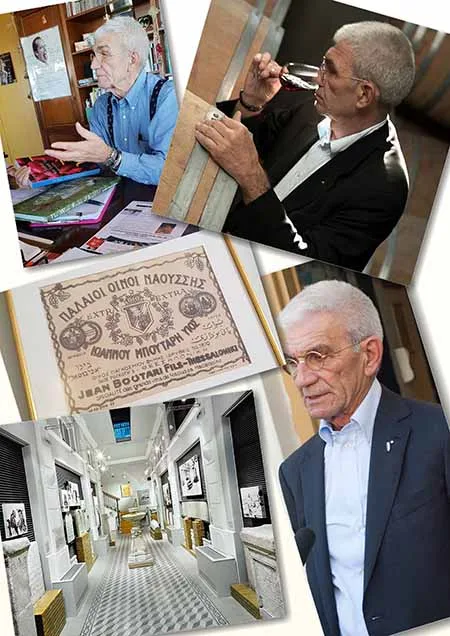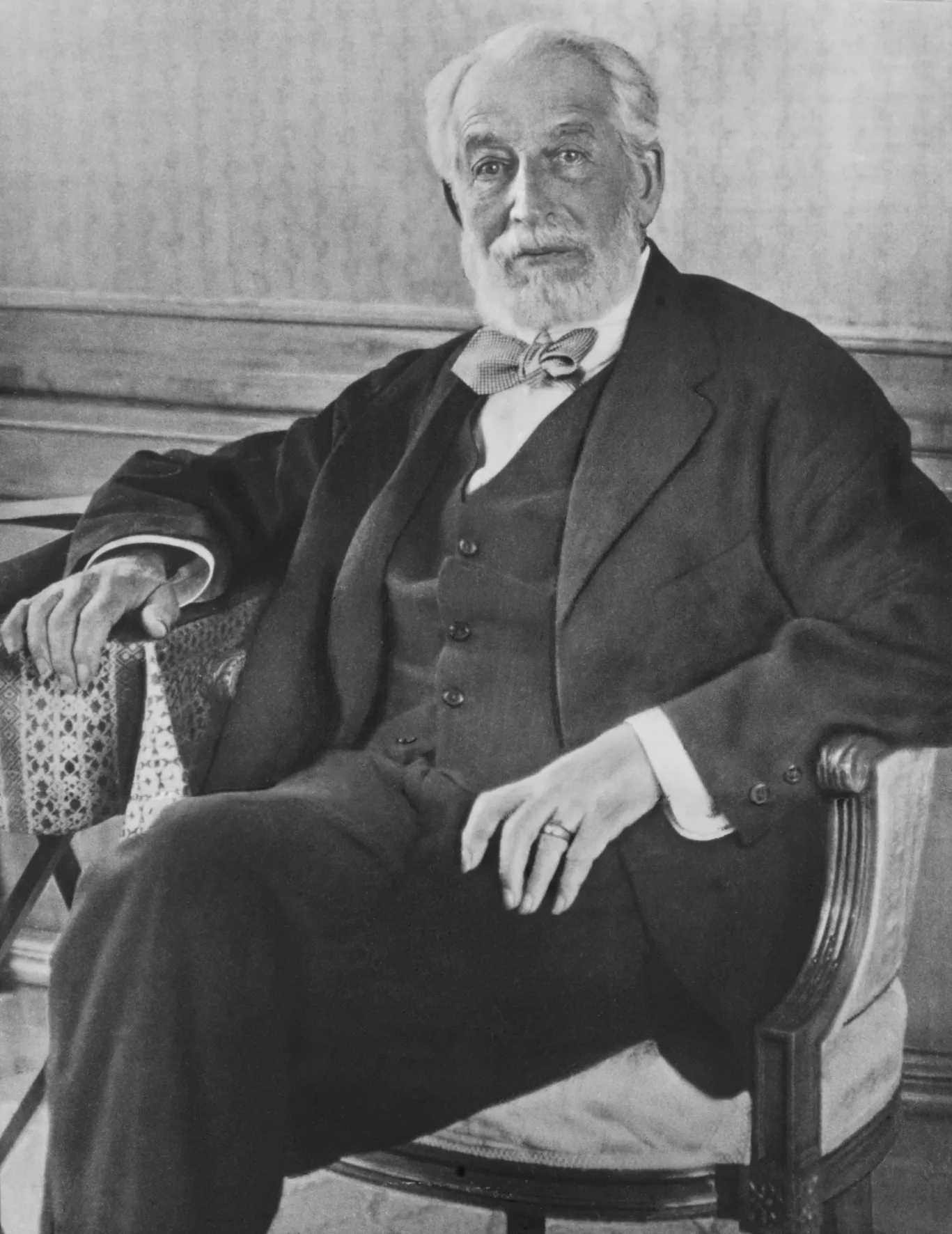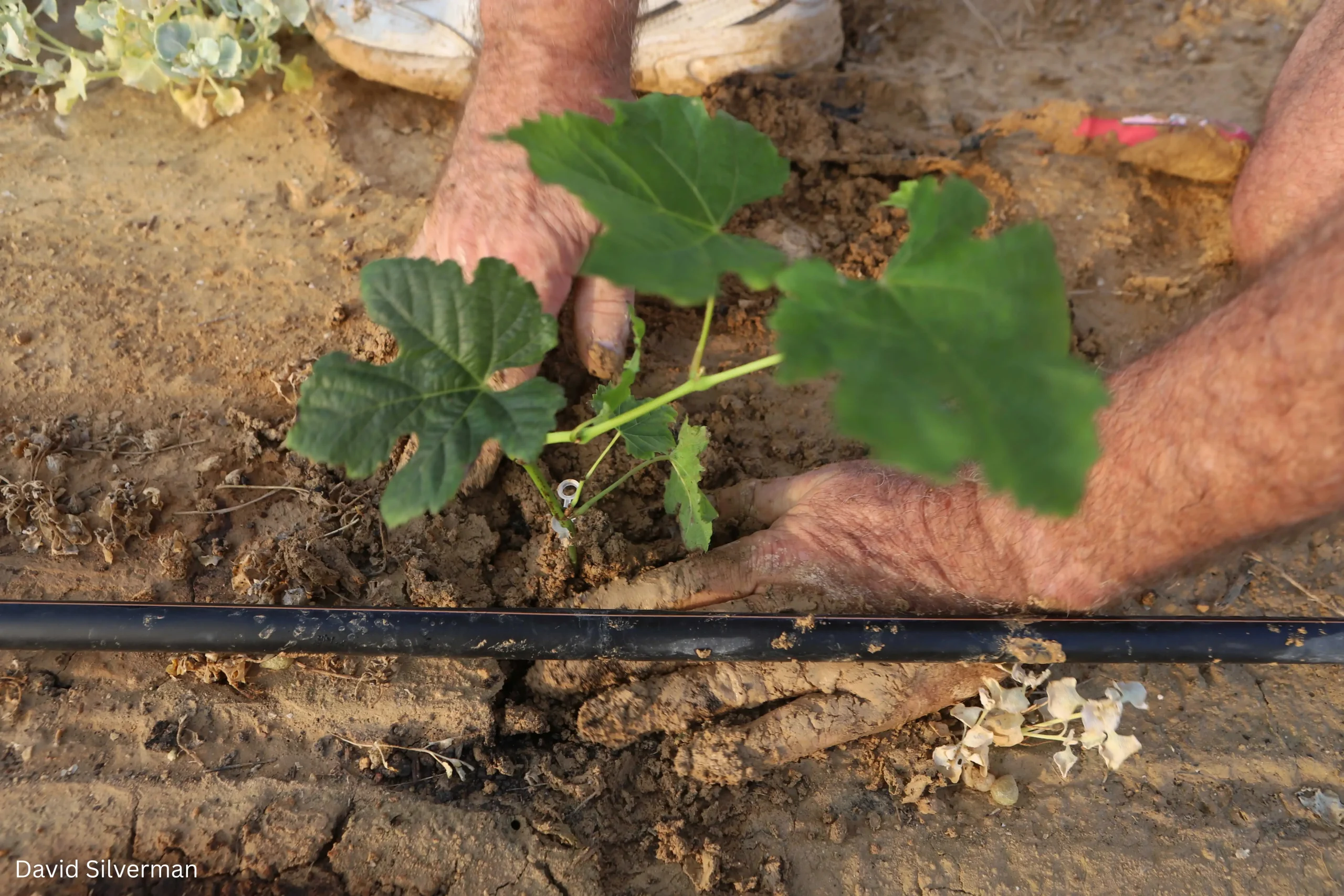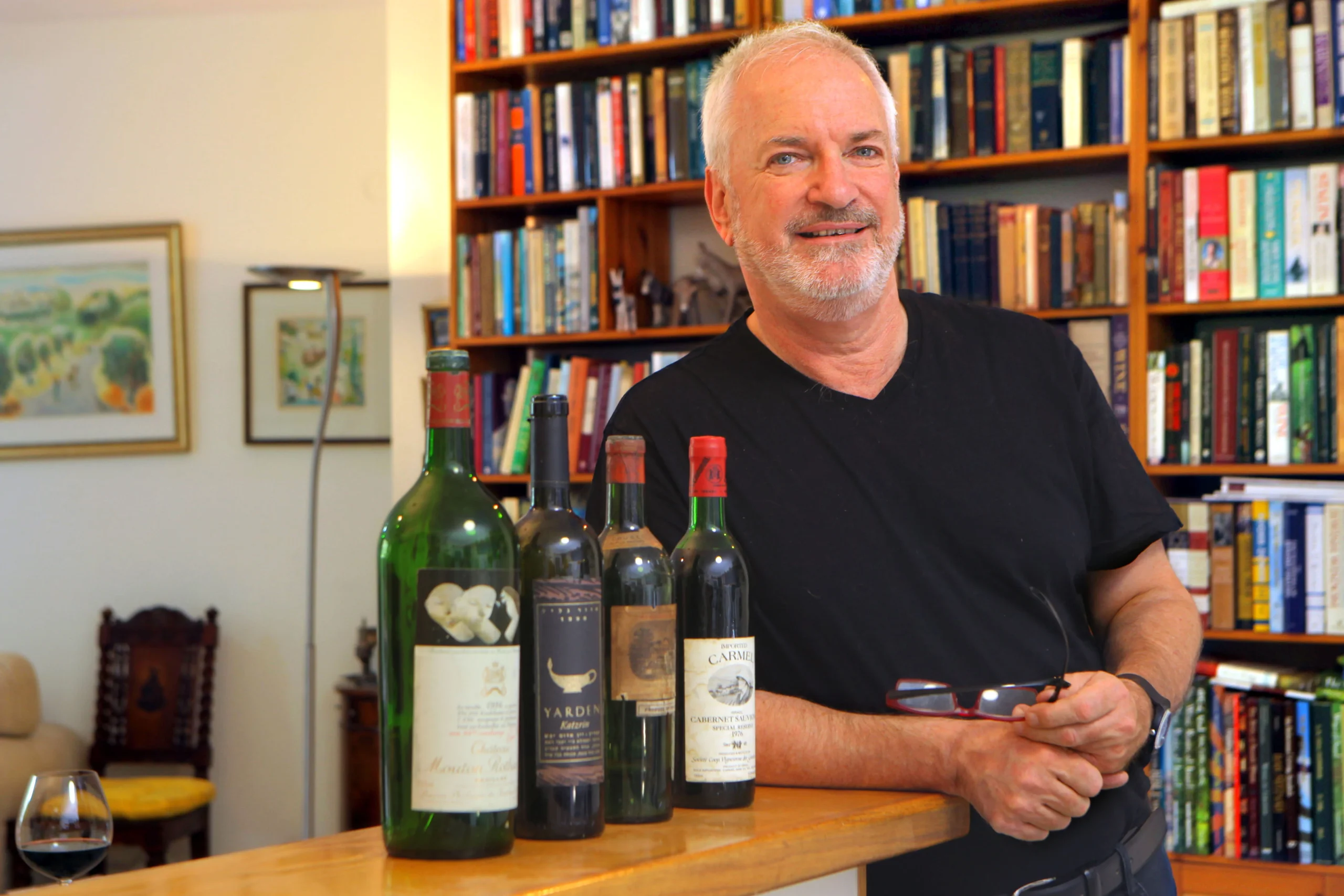Yiannis Boutaris is a giant of Greek wine and one of its most enduring icons. He was arguably the most prominent figure of the Greek wine revolution and a pioneering figure, whose search for quality and authenticity was followed by many others. The move to regionalization, the idea of becoming wine growers instead of solely producers, the focus on indigenous varieties and the pursuit of quality were all moves he initiated. He believed in the importance of wine tourism and the concept of advancing the Greek wine brand and his efforts were echoed by the Greek wine industry as a whole.
Yiannis Boutaris is wiry, slightly stooped and bow legged, with round metal glasses, gelled spiky grey hair and thick dark eyebrows. He sports an earring and seven tattoos. He wears numerous jangling bracelets and bangles. His office is fill of bric a brac and cheap tac. It looks like that room in the house that has never been tidied. He never wears a tie, but will agree to a jacket which covers his colorful braces. His desk carries a likeness of a phallic symbol and also a pad containing Hebrew letters. He is eccentric and is charismatic, but speaks quietly and gives an air of honesty & authenticity. However, today he is no longer in the wine trade. Meet the Mayor of Thessaloniki!
This is the person who when elected mayor for the second time in 2014, decided to do so wearing a yellow star with the word ‘Jude’ on it. This was in protest to the far-right wing party Golden Dawn, which has strengthened in recent years. His decision was based only on principle, as there was no obvious electoral gain from this stand.
He has gone on to become one of the most famous Mayors in the world and has proved to be a wonderful friend of the Jewish people. I decided to look into his career further and found a man who had turned over tables a number of times in his career.
Born in 1942 in Thessaloniki, he grew up destined to join the family winery, Greece’s oldest, which was founded by his great grandfather, also named Yiannis Boutaris. He reached the position of managing director at a time when it was one of the largest and most influential wineries in the country. Characteristically, he immediately started a program of regionalization and buying vineyards, previously against the company policy, leading a quality revolution in the company and being a forerunner of the quality revolution in the country.
Then in 1996 he abruptly left, giving up his birthright, after disagreements with his brother. He then found a new small winery dedicated to making wine mainly from one single variety from a single vineyard. As such he led the boutique winery revolution in Greece, but did so unselfishly, encouraging others to strive for quality and he became the leading figure in the advance of the Xinomavro grape variety and the Naoussa wine region. To show this pioneer did not just live in a bottle, he also transformed an abandoned village owned by his family into a wildlife reserve called Arcturos.
Despite being the most influential and visible figure of Greek wine, he one day got up and left his wine life behind to go into politics. In 2003 he passed the baton to his son and never again interfered in the management of the winery he had built. In 2006 he stood for Mayor in Thessaloniki as a pro business social democrat. As a non-politician, with no political base and infrastructure, he failed, but was not deterred. He was prepared to play the long game. As my old school motto says, fortune favors the brave. In 2010 he was elected as Mayor of Greece’s second largest city.
He started at one of the worst times in Greek history. The economy was in ruins, the previous Mayor was in prison owing to corruption and there was no credit or patience in the bank for failed politicians. Yet he succeeded in turning around his city’s economy by good business sense, practical management, and decisions by consensus. He reduced the budget deficit, significantly cut the workforce in city hall and restructured the city administration. As for personal example, he forgoes the Mayoral limousine with a chauffeur, and instead drove an eco-friendly Panda Fiat. He can even be seen pedaling by bicycle on occasions reminding everyone that this is no normal politician. In fact, he doesn’t see himself as a politician, but simply as a businessman, taking on a new project. He says: “I come from the business world and the civil society and I always try to solve problems in a practical way.” When I remarked at how popular he was, he jokingly said: “50% of the people love me, the other 50% hate me!’
In 2012 he was chosen as the ‘best mayor in the world’ for one particular month by the City Mayors Foundation based in London. In 2014 the Huffington Post placed him at the top of the list describing their favorite mayoral characters. Later he was nominated for the World Mayor Prize. This unconventional, progressive figure was praised as a beacon of hope and a model for Greece. He is convinced he has a duty to do the best he can for the city and its inhabitants.
He explained: “Local government, not national politics, is the essence of democracy.”
Thessaloniki’s Jewish presence goes back to 315 BCE. After the Inquisition a large Sephardi Jewish population left Spain and arrived in Salonika, as it was then named, bringing with them Ladino and Jewish customs and culture. It became part of the fabric of this vibrant, cosmopolitan city, which was even known as the Jerusalem of the Balkans. During the Holocaust, this long period of successful integration and prosperity ended abruptly, when ninety five percent of the Jewish population were sent to the camps.
The city was slow to remember its past. A monument to the 50,000 Jews murdered was placed in Thessaloniki’s Freedom Plaza in 1997. Yiannis Boutaris though considered the Jewish part of city’s history as an integral part of the discourse urging not only recognition of the Holocaust but also celebrating the Jewish contribution to the city. He has said “you can’t build a future, if you don’t know your past.” Today the 1,000 member Jewish community is full of praise for Boutaris. In 2014 the city erected a monument at Thessaloniki’s Aristotle University, which was built on the ruins of the historic Jewish cemetery. In 2013, on the 70th anniversary of the deportation, Boutaris led a public march from the Liberty Square, where Jews were rounded up, to the old railway station, where Jews were forced on to trains to the concentration camps.
In 2018, President Rivlin visited to city to lay a foundation stone for a Holocaust Museum to be built by the rail tracks. The museum will be a memorial to the Jews who were murdered, but will also be devoted to the culture and Sephardic story. The mayor says “the memorial will symbolize our shame …for what happened, for what we did, and mostly for what we could not or did not wish to do, during and after the war.”
Boutaris does not hide responsibility in his shared contrition, but is also eager to celebrate the Jewish Salonika because it gave so much to the city. When asked why, he simply says it is the right thing to do and reminisces that many of his family’s friends were Jewish. They were also customers of his winery. I saw a label of Boutaris wine dated 1906 with Hebrew written on it. On closer inspection I noted it was in fact Ladino, with Hebrew letters. That was quite a moving reminder of the strength of the Jewish community in those days.
However Boutaris is not just righting wrongs with the Jewish community. He has also showed goodwill to their Turkish neighbors. Greece & Turkey have a very complicated, fraught history. Yet Boutaris always sees the cup half full. He described Turks and Greeks as brothers, who eat the same food, have entwined memories. Kemal Attaturk’s birthplace was in Salonika. So Boutaris visited Istanbul with arms outstretched. Now more than 100,000 Turkish tourists visit each year.
Another great issue for contemporary Greece is the current migrant issue. They have had Syrian refugees foisted on them despite the economic problems in Greece. Boutaris says “it is an European problem, and Europe needs to start taking responsibility, but the Greek state must also take action to accommodate and integrate them properly.”
Nothing gets Greeks more riled these days than if you speak about the Republic of Macedonia. Many Greeks believe this is their heritage. Yet Boutaris, the conciliator recognizes they also have rights to the name much to the fury of many Greeks. When he said they should change the name of Thessaloniki airport from Macedonia as a goodwill gesture, he said it with a mischievous twinkle in his eye of someone who could say what he wanted because his only loyalty was to his own principles and truth.
I realized his unusual honesty, because when I asked about two personal issues slightly close to the bone, his private life and alcoholism, he answered immediately with no smokescreens or waffle that politicians specialize in. He was lovingly married to Athina Michael, but then they divorced as they could not live together. However real love is not skin deep. When he later said he could not live without her, she dropped everything to return to him immediately. Unfortunately, she passed away before her time in 2007. Apparently, one of his tattoos was done as a memorial to the love of his life. Later another tattoo was to done to remind him it was time to get over his grief and get on with his life.
He also spoke frankly about his alcoholism. In 1991 he recognized he had a problem gone into rehab and has remained dry ever since. He described it as a problem he dealt with and it is part of his past. I was relieved this has not stopped him tasting his beloved wine, but he never returned to spirits. He was not so strong minded with cigarettes, cradling one during our meeting, then asking permission to smoke. Everyone smokes everywhere in Greece! As the meeting went on, he sneaked out to get another one!
The 75 year old Boutaris was recently attacked and knocked to the ground by right ring thugs, who despise his stand against Golden Dawn. The rise of the right wing in Greece is scary and a warning bell for all in Europe. Yet Boutaris is a man of principle and he practices the antithesis of populist politics that is dominant in world politics today. He is a symbol of the good guy, who stands up for his beliefs, regardless of popularity and safety. A rare breed indeed. He should be preserved like an Etrog and applauded. He is a positive symbol for the Western world, a Greek icon for our times.
What does the future hold for the two time Mayor? He says: “I believe in a maximum of two terms. Power wears one down and also corrupts.” Ouch! Anyone in Balfour Street listening? An impressive iconic figure, who has created change in whatever he has done. He seems to thrive when dealing with conflict and insurmountable problems. Maybe when he finishes his term we can bring him out here!
Adam Montefiore has advanced Israeli wines for over 30 years. He is referred to as the ambassador of Israeli wine and is the wine writer for the Jerusalem Post. www.adammontefiore.com

















